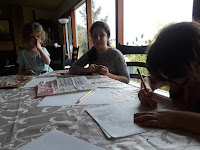I have always been bothered by how Eisav becomes 'bad'. I asked the girls if they had thoughts on this. Gabi contemplated it. Cohava ran off to ask my husband. He came in the room and said, "According to the Rashi, these twins were pretty indistinguishable in their youth. As teenagers there was suddenly a marked distinction between them. Yaakov's nature of sitting and learning had been nurtured by his parents and education, forming him into the righteous person he became. Eisav's nature was more wild, and this was not harnessed. His education was not geared to his personality and interests and he became distant and just pursued his wild tendencies in negative ways. Each child must be reared according to their unique nature."
"Good. Now we know!" Cohava announced.
"Get the Chumashim. I want us to learn it inside. I have a new idea I want to share. It is a little silly but I think there is a lot we can relate to in it."
We began to read the scene of the sale of the soup.
| 30. And Esau said to Jacob, "Pour into [me] some of this red, red [pottage], for I am faint" | לוַיֹּ֨אמֶר עֵשָׂ֜ו אֶל־יַֽעֲקֹ֗ב הַלְעִיטֵ֤נִי נָא֙ מִן־הָֽאָדֹ֤ם הָֽאָדֹם֙ הַזֶּ֔ה כִּ֥י עָיֵ֖ף אָנֹ֑כִי |
"What does 'עָיֵ֖ף' mean?" I asked.
"Tired."
"You are right, but is Eisav right? Does he need to soup because he is tired?"
"He needs a nap if he is tired," suggested Tova.
"The word Eisav really means to use he doesn't know because it wasn't invented until thousands of years later. Do you know what 'hangry' is?"
"Happy and angry," guessed Ruti. I praised her guess and was amused that this is an emotion that is unique to her.
"Horribly angry?" Gabi asked. I was even more amused that her definition was something she knows so well.
"Really hungry that you get mad," Tova suggested. I was astounded.
"Yes! Tova is right! It means so hungry you get angry," I explained. Cohava did not believe me it was a real word and looked it up online. She was shocked that it exists.
"Now that you know the word, can you think about how you feel when you get hangry and how it applies in the story?"
"Yeah, I make bad choices when I am too hungry," Gabi reflected. "Eisav just got overwhelmed and made a bad choice."
Another proof on hanger being the cause of Eisav's downfall is that immediately after this story, the Torah recounts a famine in the land.
How do we combat hunger?
How do we combat hanger?
B"H, for us it is not a matter of actually being able to afford food. It is eating well-balanced food items, in a timely manner, before hanger sets in.
The girls and I embarked on menu planning.
Truth: I am the one opposed to meal planning. To me it means pressure to have the right ingredients on hand, commitment to one item with no flexibility. I think I am in the minority as a parent opposed to organizing meals.

Eventually we came up with a plan that made everyone happy. The weekly menu is the same, but the flexibility is endless. In case you cannot read the dry-erase board on the fridge:
Sunday- 'Sunday Special' all of Shabbats Greatest Hits on Repeat (aka leftovers from Shabbat).
Monday- Big Salad- this can be any kind of salad, the possibilities are endless.
Tuesday- Taco Tuesday- this could be tacos, spanish rice, nachos, burritos, any form of Tex-Mex.
Wednesday- Souper soup. Again endless possibilities.
Thursday- Noodle night. Shabbat prep starts early. I will boil the noodles. If have time it will be tuna casserole or something. If not, they can put on whatever they want.
Shabbat meals are Shabbat meals. That menu plan is always a google docs worth.
I love the simplicity and open-endedness of this. The girls are very enthusiastic.
Back on the parasha:

The younger girls are not as familiar with the parasha stories.
In addition to our Torah books, the girls enjoy watching this cute puppet show series. They like the puppets and want to do it themselves. I do have puppets and tell the story this way at school but there is never enough Rivkah to go around.
The girls enjoyed making paper bag puppets.


Shabbat Shalom!









No comments:
Post a Comment